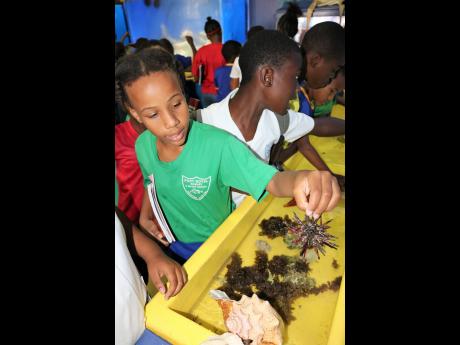Getting educated on conserving wetlands, sustaining ecosystem
Forty students from two St Andrew schools had a chance to get a heads-up and a hands-down on marine ecosystems and their importance.
'Wetlands for a Sustainable Urban Future' was the theme for World Wetlands Day 2018, observed on Friday, February 2, and these students and their teachers from the Harbour View Primary and Port Royal Primary and Infant School, St Andrew, got the chance to learn about the impact and importance of mangroves.
In a visit to the Port Royal Marine Laboratory, organised by the Kingston Freeport Terminal Limited in collaboration with the University of the West Indies (UWI) Centre for Marine Sciences, they were treated to a presentation by outreach officer Chauntelle Green, who tested their knowledge.
Then they got a chance to observe a Jamaican iguana before heading to the diversity centre, where they got up close with some of the inhabitants. Then it was off on a boat ride to observe activities on Refuge Cay, other wetlands in the Port Royal Cays.
Wetlands are critical as they help to reduce soil erosion, flooding, and are home to a thriving ecosystem.
It is estimated that half of humanity, about four billion people, lives in urban areas today. By 2050, that proportion will reach 66 per cent as people move to cities in search of jobs and a vibrant social life.
Cities account for around 80 per cent of global economic output. As cities expand and demand for land increases, the tendency is to encroach on wetlands. They are degraded, filled in, and built upon.
This needs to be addressed.
Denee Engedi Gray, a 12-year-old Grade 6 student at the Harbour View Primary School, liked everything, but one thing stood out above all else from her visit to the centre.
"It was very interesting because we learnt that the male sea horse had children - gave birth. I didn't know that," before admitting that the brittle star fish gave her the creeps.
"That one was wriggly, it felt disgusting. No, I was so brave," she admitted when asked if she had touched the bigger star fish. Overall, though, she was very impressed and had a message for schoolmates who missed the trip.
"I'm going to tell them seh come over here. It's very pretty and I enjoyed myself," she told Arts and Education.
Guidance Counsellor Moyen Campbell welcomed the opportunity for the trip because of the exposure to things different she anticipated it would provide.
"They can go back and motivate their other classmates to keep their environment - their classroom, the canteen, just the whereabouts of the school - clean. So I think it's a good initiative by the organisation that put it on, and I hope that they will do their job as it relates to spreading the word to their classmates."
Another Grade 6 student, 11-year-old Jelani Barnett's first trip on a boat was somewhat spoilt by the fact that he was seated towards the back of the vessel and had to bear with the vibrations of the power engines.
Despite that, the trip was "very fun", and while he knew that mangroves grew in water, he was very impressed by the number of birds, mangroves, crabs, and sponges.
"Well, its going to help me in the future because maybe people ask me if I went on a trip or something, and I can just explain to them that yes, this and that. You can also help [educate] people that don't actually go out that much," he said.
Dominique Johnson, who was also making her first boat ride, remembers well and now has a greater appreciation for how "the mangroves protect the animals from the hurricane".





